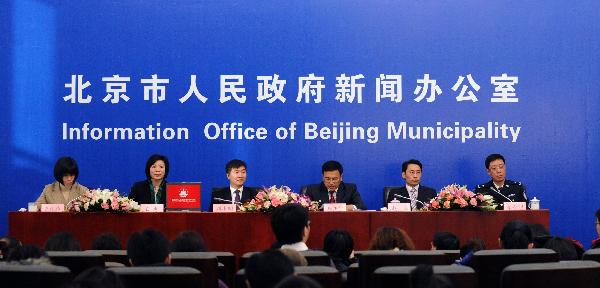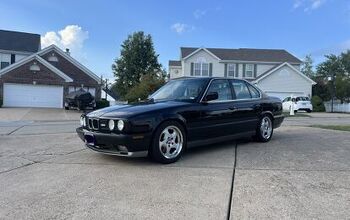Beijing Hands Down Harsh Measures Against New Cars

China’s Capital Beijing received a largely unwanted Christmas present yesterday: Drastic curbs on new car registrations. “Under the new regulations, vehicles purchased starting today will be subject to strict new restrictions,” reports Global Times, “setting off a last-minute, car-buying spree last night.”
- The city will license only 240,000 new vehicles next year, and buyers of new cars will have to apply for license plates by means of a lottery. This quota is about a third of the 700,000 new cars that have hit Beijing roads this year.
- Only permanent residents of Beijing, as well as “military servicemen, foreigners, residents of Hong Kong, Macao and Taiwan” are eligible to apply for license plates.
- Cars not licensed in Beijing will be barred from entering the main city area during rush hours on work days.
- Beijing municipal government agencies and public institutions will not increase the size of their motor vehicle fleets during the next five years.
- A Beijing driver will be permitted to own only one car in his or her name.
- Car owners who replace their old vehicles will be automatically given new car plates and do not have to take part in the lot-drawing.
The China Assoc
iation of Automobile Manufacturers (CAAM) protested, saying that the new restrictions are unfair, and that the limit on auto purchases will have a negative impact on the general economy in China. The resale value of my car in the downstairs garage in Beijing however exploded overnight.
Grouching Beijingers have themselves to blame: Earlier this month, the Municipal Commission of Transport released a draft plan on clearing traffic congestion, which was posted online to gauge public reaction from Dec 13 to 19. More than 3,000 responses were received from members of the public and only 5.8 percent of the respondents opposed the plan. However, the plan had mentioned nothing a bout a drastic limitation.
Even before the earlier draft plan was published, rumors of limits ran rampant in Beijing over the last two months, prompting a reverse effect: Sales of cars in Beijing reached 96,000 units last month, an increase of 24,000, or up 33 percent, says the CAAM. A total of 30,000 new vehicles were licensed in the past week alone, the Xinhua News Agency reports. Car ownership in the city has surged to 4.7 million vehicles this year from 2.6 million in 2005. Yet, this represents a car density of only 210 per thousand in China’s second most populous city. The average in China is 63 per thousand. The average in the U.S.A. is more than 800 cars per thousand.

Bertel Schmitt comes back to journalism after taking a 35 year break in advertising and marketing. He ran and owned advertising agencies in Duesseldorf, Germany, and New York City. Volkswagen A.G. was Bertel's most important corporate account. Schmitt's advertising and marketing career touched many corners of the industry with a special focus on automotive products and services. Since 2004, he lives in Japan and China with his wife <a href="http://www.tomokoandbertel.com"> Tomoko </a>. Bertel Schmitt is a founding board member of the <a href="http://www.offshoresuperseries.com"> Offshore Super Series </a>, an American offshore powerboat racing organization. He is co-owner of the racing team Typhoon.
More by Bertel Schmitt
Latest Car Reviews
Read moreLatest Product Reviews
Read moreRecent Comments
- Formula m For the gas versions I like the Honda CRV. Haven’t driven the hybrids yet.
- SCE to AUX All that lift makes for an easy rollover of your $70k truck.
- SCE to AUX My son cross-shopped the RAV4 and Model Y, then bought the Y. To their surprise, they hated the RAV4.
- SCE to AUX I'm already driving the cheap EV (19 Ioniq EV).$30k MSRP in late 2018, $23k after subsidy at lease (no tax hassle)$549/year insurance$40 in electricity to drive 1000 miles/month66k miles, no range lossAffordable 16" tiresVirtually no maintenance expensesHyundai (for example) has dramatically cut prices on their EVs, so you can get a 361-mile Ioniq 6 in the high 30s right now.But ask me if I'd go to the Subaru brand if one was affordable, and the answer is no.
- David Murilee Martin, These Toyota Vans were absolute garbage. As the labor even basic service cost 400% as much as servicing a VW Vanagon or American minivan. A skilled Toyota tech would take about 2.5 hours just to change the air cleaner. Also they also broke often, as they overheated and warped the engine and boiled the automatic transmission...


































Comments
Join the conversation
Singapore has similar rules and higher costs. This is what happens when reality catches up with the fantasy of private vehicle ownership. Japan requires a parking space to be proven to exist for a car before it can be registered in certain areas. I paid 300 a month for a spot and it came with dimensions too, lest I try to register something bigger than the spot. In Singapore the Certificate of Entitlement ( CoE) usually costs more than the car.
Those horrific scenes of the haze can't be because of the cars can it? The density isn't there. And what of truck traffic? With the growth rates, economic development and migratory patterns I'd wager that the so called relief will be minor at best.